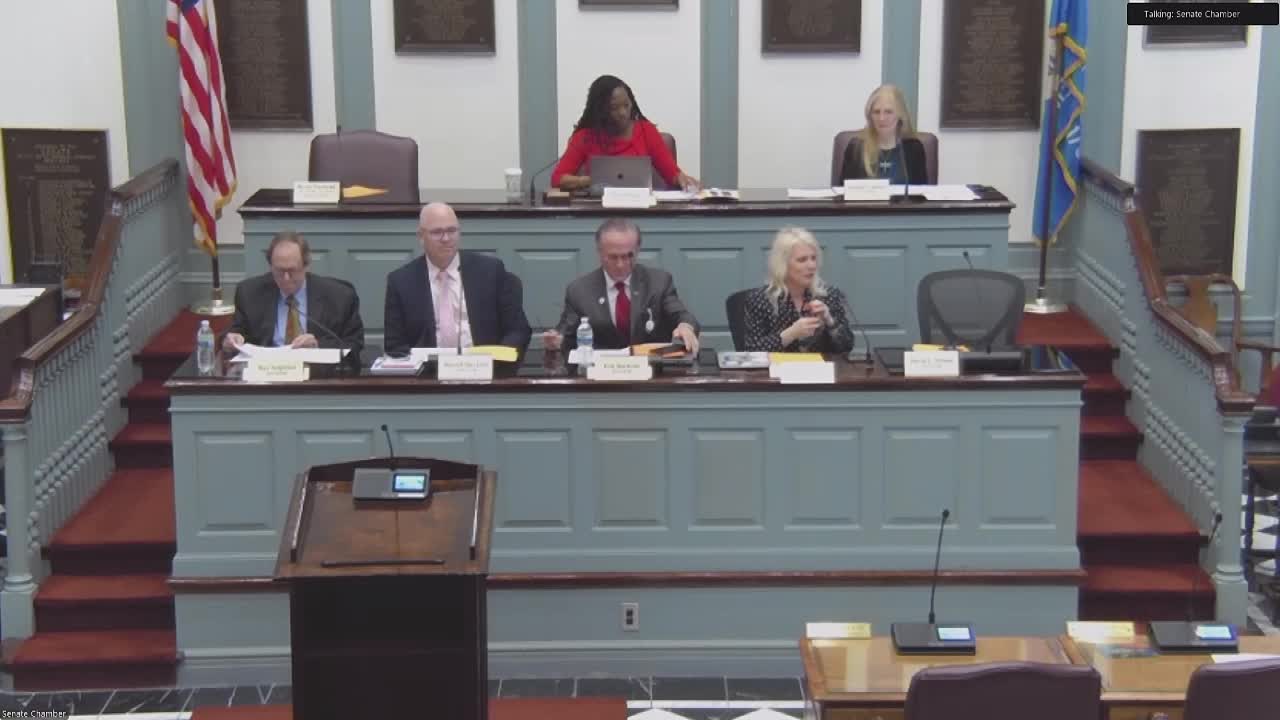Committee reviews bill to classify tianeptine as Schedule I amid safety and criminalization debate
Get AI-powered insights, summaries, and transcripts
Subscribe
Summary
Senator Sarah Hansen presented House Bill 21 to the Senate Health and Social Services Committee, asking the panel to classify tianeptine as a Schedule I controlled substance and ban its sale in places such as gas stations and vape shops.
Senator Sarah Hansen presented House Bill 21 to the Senate Health and Social Services Committee, asking the panel to classify tianeptine as a Schedule I controlled substance and ban its sale in places such as gas stations and vape shops.
Supporters told the committee they view the drug as a growing public-health threat: the Department of Justice and the Delaware State Police said early action could prevent wider availability, and the Medical Society of Delaware urged the ban citing dependence, withdrawal and documented severe side effects.
The bill’s sponsor, Representative Williams, alerted lawmakers after receiving reports from a school in her district that referenced information from the Children’s Hospital of Philadelphia and the Poison Control Center. Senator Hansen summarized those reports during the presentation and said that Poison Control had received about 15 adverse-exposure reports tied to tianeptine in the Pennsylvania and Delaware Avenue area.
Christy, a Department of Justice witness, told the committee that scheduling a substance in Delaware places it within the state’s controlled-substances framework and ties the substance to the state’s quantity-tier system for drug-related offenses. "That classification ... determines how the drug is regulated," Christy said, and she described three tiered quantity categories used in Delaware. She said the Division of Forensic Science would determine appropriate measurement thresholds (for example doses, grams or milliliters) that in turn inform criminal penalties.
Sergeant Mike Ripple of the Delaware State Police said state law enforcement supports regulation now, before wider availability. Ripple indicated that mere possession would likely remain a low-level offense and said the Department anticipates the possession offense would fall at the level of a class B misdemeanor while larger quantities or distribution would carry higher penalties. "We're not looking to felonize people for the mere possession or use of this drug," Ripple said, while urging the committee to act to remove unregulated sales from the market.
Jovan Rich, policy and advocacy director for the ACLU of Delaware, urged the committee to withdraw House Bill 21. Rich argued the measure would "harm people who are struggling with substance use disorders" and called for investing in treatment and individualized supports rather than criminalization. He noted that a class B misdemeanor can still carry up to six months in jail and fines, and asked lawmakers to reconsider criminal penalties tied to possession.
Doctor Richard Henderson, chair of the Medical Society of Delaware’s government affairs committee, told the panel that tianeptine is not FDA-approved in the United States and that higher-dose exposures have been associated elsewhere with dependence, withdrawal, respiratory problems and death. "Withdrawal symptoms often require hospitalization and treatment," Henderson said, and the Medical Society expressed support for the bill.
Committee members asked several procedural and scope questions. Christy (DOJ) explained that scheduling the drug does not by itself set sentencing ranges and that sentencing guidance is handled by courts and the administrative office of the courts; she reiterated that forensic testing will determine the quantity thresholds that map into Delaware’s tier system. Committee members also sought clarification whether stores currently have any legal restriction preventing sales to minors; Ripple said he was aware of no such regulation and that the product is not regulated like nicotine products at this time.
Chair Senator Pinkney said she would circulate the bills for signatures so they could be released from committee; the transcript records no formal committee vote on House Bill 21 during the session. The committee accepted in-person and virtual testimony and reminded the public that written comments may be submitted to the Health and Social Services Committee email and will be made part of the public record.
At the close of the item the chair asked that witnesses and the public follow up in writing; no final committee action or floor referral was recorded during the meeting.
